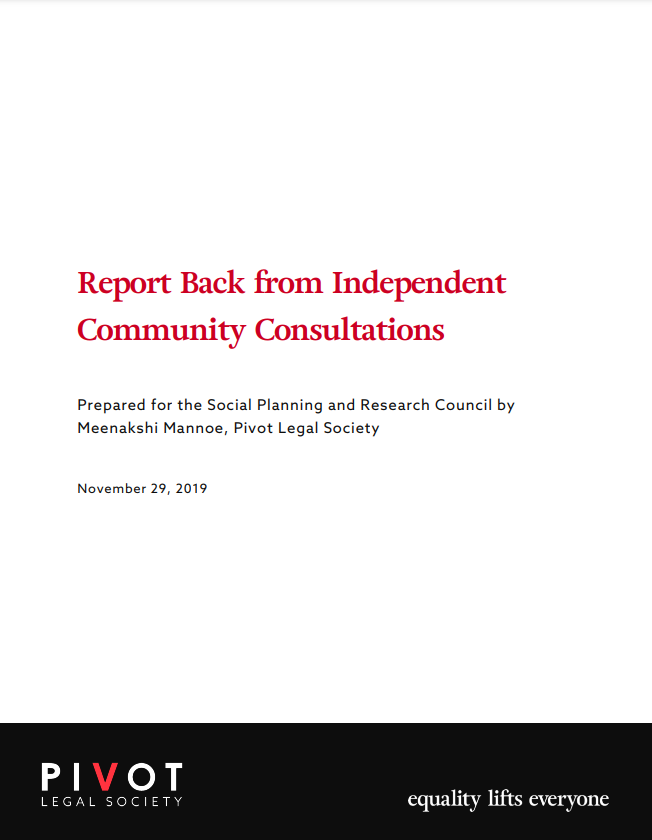7 search results
Recommendation 1:
The Province of British Columbia must amend the Human Rights Code, RSBC 1996, c 210 to prohibit discrimination and harassment based on social condition.
-
Category and theme:
Audience:
Groups affected:
Location of recommendation:
Recommendation 2:
The Ministry of Mental Health and Addictions and the Ministry of Health must improve the ability of BC hospitals to meet the needs of people living with the effects of substance use, mental illness, and/or homelessness by:
- auditing experiences in hospitals, beginning with an analysis of people’s experiences where they have been turned away from emergency rooms or discharged and where there have been negative health consequences;
- working with people with lived experience to audit provincial standards for effectively managing substance withdrawal in hospital settings;
- ensuring that all hospitals offer supervised consumption services to patients; and
- working with the Ministry of Municipal Affairs and Housing to create transitional housing options to ensuring that sick and injured people are not released from the hospital to the streets or to emergency shelter.
-
Category and theme:
Audience:
Groups affected:
Location of recommendation:
Recommendation 3:
The Ministry of Social Development and Poverty Reduction must make immediate changes to BC’s Income Assistance and Disability Assistance programs including:
- increasing income assistance rates to the Market Basket Measure and indexing them to inflation;
- reviewing the processes that are currently in place for reporting “welfare fraud” to provide greater accountability and ensure that people receiving income assistance are not denied survival income without due process;
- increasing access to in-person services for income assistance and disability applicants; and d. ensuring that people living with disabilities can access disability support by:
- simplifying the application process to reduce wait times and lessen reliance on advocates;
- providing provincial guidelines for doctors/service providers on how and when to fill out disability forms; and
- ensuring that hospital social workers are resourced and directed to work with patients in need to apply for disability benefits.
-
Category and theme:
Audience:
Groups affected:
Location of recommendation:
Recommendation 4:
The Legal Services Society of BC must provide legal support for appeals where a person has been denied income assistance or disability assistance.
-
Category and theme:
Groups affected:
Location of recommendation:
Recommendation 5:
All government actors and health care providers must recognize the specific and indispensable expertise of people with lived experience. Increase peer-run and peer-delivered services and peer-support positions within government services by:
- developing a provincial advisory board of people with lived experience of homelessness for BC Housing;
- establishing provincial best practices for engaging people with lived experience of poverty, homelessness, and substance use in service delivery modelled on GIPA (Greater Involvement of People living with HIV/AIDS), MIPA (Meaningful Involvement of People Living with HIV), and NAUWU (Nothing About Us Without Us) principles;
- collaborating with peer-led organizations to audit all provincial services (hospital, health, income assistance, shelter, housing) to identify and fund opportunities for peer engagement in service provision and planning; and
- developing a model for peer-involvement in the design and execution of homeless counts.
-
Category and theme:
Groups affected:
Location of recommendation:
Recommendation 6:
In consultation with experts, including human rights law organizations, trauma specialists, and people with lived experience, the Province of British Columbia should adopt a standardized tool and training protocol for conducting “stigma audits” of current laws, policies, and regulations in BC, and to inform the development of new laws, policies, and regulations.
-
Category and theme:
Groups affected:
Location of recommendation:
Recommendation 7:
The relevant provincial ministries should engage in extensive education and outreach to legislators and staff across the provincial government, and local governments to introduce the stigma-auditing tool to law and policymakers, and to train stigma auditors.
-
Category and theme:
Groups affected:
Location of recommendation:
